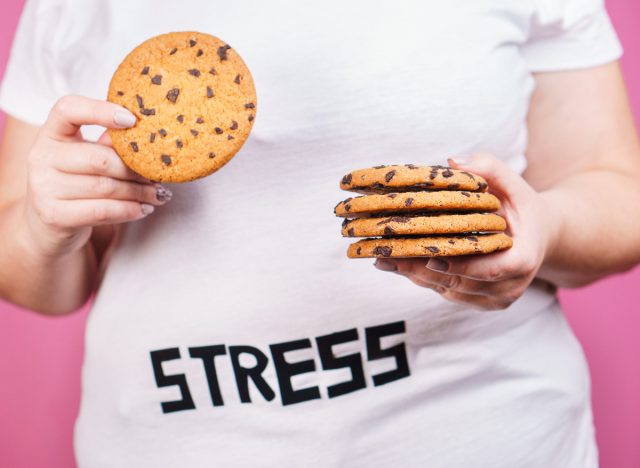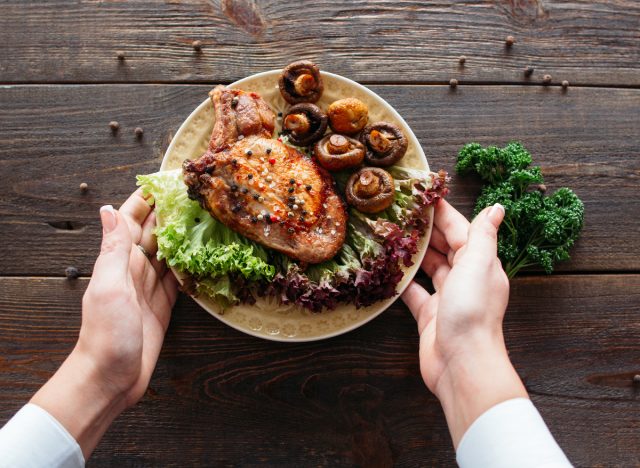Feeling stressed out is never a good thing. As a matter of fact, anxiety can cause many health issues that may surprise you. Did you know that even your abdomen can be impacted by too much stress? If you’re wondering, “What is a stress belly and how do I get rid of it,” we’ve spoken to an expert and are here to explain the details. Keep reading to learn more, and next up, don’t miss Get Rid of Your Balloon Belly With These Free Weight Exercises.
What is a stress belly?

Mike Bohl, MD, MPH, ALM, the Director of Medical Content & Education at Ro and a member of our Medical Expert Board, explains to Eat This, Not That! the term “stress belly” is just that—a term rather than a medical condition. But it’s a real thing and describes the fat that accumulates around your abdomen, sometimes because of high stress levels. If you think this sounds pretty unhealthy and a downright sneaky situation, you’re right.
This is how a stress belly occurs. According to Dr. Bohl, when your stress level is elevated, your adrenal glands release higher amounts of the hormone known as cortisol. Cortisol’s function is to store fat in your abdomen and also to shake up your appetite. Hence, getting stressed out can actually create a calorie overload and unwanted abdominal fat, resulting in a dreaded stress belly. If this sounds familiar, learn the steps you need to take to get rid of it.
How do I get rid of a stress belly?
Dr. Bohl tells us that if elevated cortisol levels are contributing to extra fat in the midsection, the main key to getting rid of that stress belly is to control your stress level, which takes precedence over your diet. Putting anxiety reduction at the top of the list doesn’t mean food choices and cutting calories aren’t important; it simply means managing your stress is the very first step.
Unfortunately, attempting to target that belly girth isn’t achievable, Dr. Bohl points out. That’s known as spot reduction, and you can’t pick and choose body parts when trying to lose weight. But what you can do is incorporate some helpful habits to lose weight all over. In doing so, you’ll reduce your belly fat, too. Here are some helpful tips on how to do it.
1. Eliminate alcohol, or cut it down drastically.

Dr. Bohl advises, “When it comes to dieting, the nutrition tips to get rid of stress belly are essentially the same as the nutrition tips to lose weight in general. Perhaps closer to the top of that list, though, is reducing alcohol consumption.”
Alcohol is a big calorie addition to your diet. Plus, it’s linked to accumulating higher levels of visceral fat, which is the fat that wraps around your organs.
2. Opt for a healthy plant-based diet.
Another nutritional step is to change your eating to a healthy plant-based diet of fruits and vegetables. Foods that are plant-based are typically higher in nutrients, lower in calories, and contain fiber, which is essential for your digestion. Fiber is a great friend to your diet, as it helps make you feel fuller and eat less.
3. Eat at a calorie deficit.
“Overall, it’s important to eat at a calorie deficit, so you’re burning more calories than you take in,” says Dr. Bohl. In addition, avoid—or take a much smaller helping of—foods heavy in carbohydrates, such as fries, pasta, and bread.
4. Reduce the size of your plate.

Choose a plate that’s all-around smaller. This trick really works! You’ll start your meal with less food on your smaller plate and will have to think if you really want more.
5. Take time while you dine.
This one is easy. Simply relax and eat meals at a slower pace. Dr. Bohl shares, “It takes time for your body to realize when it is getting full.”
6. Crank up your protein consumption.
Maintaining a high-protein diet (consisting of lean proteins, like tofu or chicken) is also helpful in losing weight, as protein consumption builds muscle mass. More muscle mass burns higher calories each day.
7. Choose a less-sweetened lifestyle.

It’s important to lower your intake of sugar-sweetened beverages such as sodas and juices. This is a surefire way to cut calories you may not even be aware you’re adding. Water is always a great choice! Besides, think of all the money you will save on your grocery bill.
8. Add leafy greens, dark chocolate, avocados, and olive oil to your shopping list.
Foods high in omega-3 fatty acids, such as olive oil and avocado, may contain beneficial anti-inflammatory effects, and food items containing a high magnesium content, such as leafy greens and dark chocolate, may be helpful in lowering stress levels, too.
Alexa Mellardo

